

Using TED-Ed to Create Mini Lessons. What is TED-Ed?
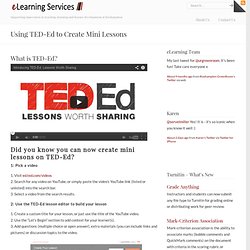
Did you know you can now create mini lessons on TED-Ed? 1: Pick a video 1. Visit ed.ted.com/videos 2. Search for any video on YouTube, or simply paste the video’s YouTube link (listed or unlisted) into the search bar. 3. 2: Use the TED-Ed lesson editor to build your lesson. The myth of learning styles. Three children doing group work together.
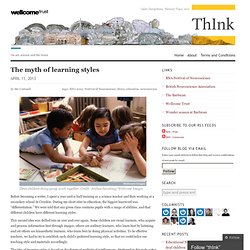
Practice, Practice, Practice: Getting that Talk Right. As my last post noted, my mind is inclined to go for a walk during seminars if I’m not careful.
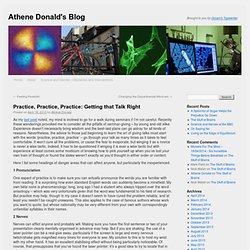
Recently these wanderings provoked me to consider all the pitfalls of seminar-giving – by young and old alike. Experience doesn’t necessarily bring wisdom and the best-laid plans can go astray for all kinds of reasons. Nevertheless, the advice to those just beginning to learn the art of giving talks must start with the words ‘practice, practice, practice’ – go through your talk as many times as it takes to feel comfortable. 7 Little-Known Tech Tools Teachers Should Try Out. There are hundreds of thousands of apps, tools, and websites that teachers could learn from.
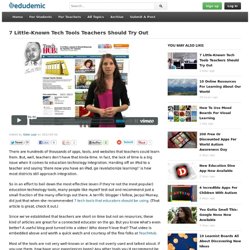
But, well, teachers don’t have that kinda time. In fact, the lack of time is a big issue when it comes to education technology integration. Real Lives and White Lies in the Funding of Scientific Research. Citation: Lawrence PA (2009) Real Lives and White Lies in the Funding of Scientific Research.
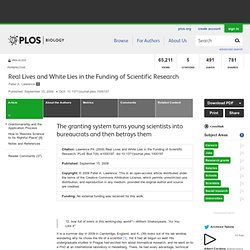
PLoS Biol 7(9): e1000197. doi:10.1371/journal.pbio.1000197 Published: September 15, 2009 Copyright: © 2009 Peter A. Thought Catalog: What Education SHOULD Teach Us. The 12 cognitive biases that prevent you from being rational. Essay on how to end student complaints on grades. You are the best teacher in the world and you’ve just turned in your grades for the best class you’ve ever taught.
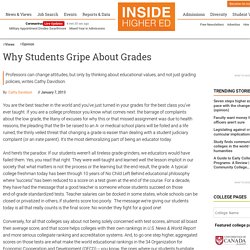
If you are a college professor you know what comes next: the barrage of complaints about the low grade, the litany of excuses for why this or that missed assignment was due to health reasons, the pleading that the B+ be raised to an A- or medical school plans will be foiled and a life ruined, the thinly veiled threat that changing a grade is easier than dealing with a student judiciary complaint (or an irate parent). The Role of Socratic Questioning in Thinking, Teac. One of the reasons that instructors tend to overemphasize “coverage” over “engaged thinking” is that they do not fully appreciate the role of questions in teaching content.

Consequently, they assume that answers can be taught separate from questions. Indeed, so buried are questions in established instruction that the fact that all assertions — all statements that this or that is so — are implicit answers to questions is virtually never recognized. For example, the statement that water boils at 100 degrees centigrade is an answer to the question “At what temperature centigrade does water boil?” Hence every declarative statement in the textbook is an answer to a question. Student, youth & young professional research. The Cost of Knowledge. Twitter Guide Book – How To, Tips and Instructions by Mashable.
Online resources. Enhancing Feedback. Noam Chomsky on the purpose of education. #IamScience: Embracing Personal Experience on Our Rise Through Science. Why every (psychology) student should learn to code « Computing for Psychologists. Why should you, as a psychology student, or indeed any other kind of student, need to learn computer programming?
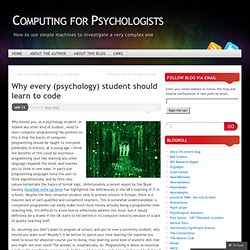
My position on this is that the basics of computer programming should be taught to everyone, preferably in schools, at a young age. "Keep the Customer Satisfied". A longitudinal study of students' emotions, experiences and achievements at the University of Joensuu. Email: Juhani.Rautopuro@Joensuu.fi & Pertti.Vaisanen@Joensuu.fi Introduction In our era of close accountability, when governments require quality assurance from publicly funded institutions, universities have become prime targets of economic scrutiny.
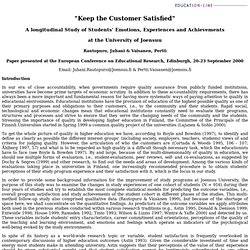
In addition to these accountability requirements, there has always been a more important and fundamental reason for having more systematic ways of paying attention to quality in educational environments. Educational institutions have the provision of education of the highest possible quality as one of their primary purposes and obligations to their customers, i.e., to the community and their students. Rapid social, technological and economic changes mean that educational institutions constantly need to evaluate their programs, structures and processes and strive to ensure that they serve the changing needs of the community and the students. Good university teaching is important.
Review of the Literature Student Satisfaction. Importance Of Philosophy. American RadioWorks. By Emily Hanford College students spend a lot of time listening to lectures.
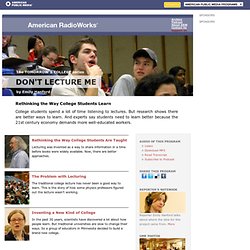
But research shows there are better ways to learn. And experts say students need to learn better because the 21st century economy demands more well-educated workers. Readability index calculator. Digital literacy can boost employability and improve student experience. The nature of knowledge is changing and, in this digital age, our definition of basic literacy urgently needs expanding. With an estimated 90% of UK jobs requiring some level of IT competency, the notion of digital literacy – those capabilities that equip an individual for living, learning and working in a digital society – is one that needs to be taken seriously by colleges and universities.
We live in an online world with the digital divide closing up both through government initiatives (Martha Lane Fox, the government's digital champion, recently took up the challenge of getting 10 million people in the UK online, saying that otherwise "they will be even more isolated and disadvantaged as government and industry expand ever faster into digital-only services") and technological advances – more than half the UK population now own a smartphone with internet capability.
Sharing Control: a partnership approach to curriculum design and delivery. Start date: 2011-03-01End date: 2011-07-31Status: completeFunding Initiative: Higher Education Academy This project considers student engagement in curriculum design and delivery, particularly the inter-relationship between institutional levels of governance and leadership and course level design and delivery - and indeed the individual level of student learning and achievement. The project is particularly interested in ensuring informed and active student participation in curriculum design and delivery.
To achieve this we will consider genuine student engagement in terms of broader institutional change, and particularly the inter-relationship between micro, meso and macro levels of the university, and how these impact upon the curriculum.